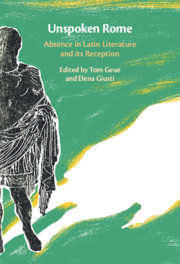Book contents
- Unspoken Rome
- Unspoken Rome
- Copyright page
- Contents
- Figures
- Unspoken Rome: Acknowledgements
- Contributors
- Introduction
- Part I Absence in Text
- Part II Absence in Context
- Chapter 7 Speaking Silence in Cicero’s Brutus and Tacitus’ Dialogus de Oratoribus
- Chapter 8 Et sine auctore notissimi uersus
- Chapter 9 Looking for the Emperor in Seneca’s Letters
- Chapter 10 Marcus Aurelius: Medi()ations Not Medi(c)ations
- Chapter 11 Lost in Germania
- Chapter 12 Conspicuous Absence
- Part III Going Beyond
- Afterword Lights Out
- Bibliography
- General Index
- Index Locorum
Chapter 11 - Lost in Germania
The Absence of History in Tacitus’ Ethnography
from Part II - Absence in Context
Published online by Cambridge University Press: 03 September 2021
- Unspoken Rome
- Unspoken Rome
- Copyright page
- Contents
- Figures
- Unspoken Rome: Acknowledgements
- Contributors
- Introduction
- Part I Absence in Text
- Part II Absence in Context
- Chapter 7 Speaking Silence in Cicero’s Brutus and Tacitus’ Dialogus de Oratoribus
- Chapter 8 Et sine auctore notissimi uersus
- Chapter 9 Looking for the Emperor in Seneca’s Letters
- Chapter 10 Marcus Aurelius: Medi()ations Not Medi(c)ations
- Chapter 11 Lost in Germania
- Chapter 12 Conspicuous Absence
- Part III Going Beyond
- Afterword Lights Out
- Bibliography
- General Index
- Index Locorum
Summary
Tacitus’ Germania is notable for its absences: lacking a preface and programmatic statements, and being the only ethnographic monograph to have survived from Greco-Roman antiquity, readers have often leapt to fill in its perceived blanks. This chapter aims at redressing the effects of overdetermined readings by interpreting the text’s absences as significant in their own right.
- Type
- Chapter
- Information
- Unspoken RomeAbsence in Latin Literature and its Reception, pp. 201 - 218Publisher: Cambridge University PressPrint publication year: 2021

